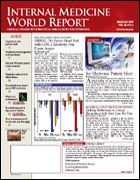Publication
Article
Vancomycin Superior to Metronidazole in Severe C difficile-Associated Diarrhea
Author(s):
From the Infectious Diseases Society of America
Clostridium difficile
TORONTO, Canada?Patients with severe ?associated diarrhea are more likely to respond to vancomycin (Vancocin) than to the typically prescribed first-line therapy, metronidazole (Flagyl), according to a new prospective study presented at the Infectious Diseases Society of America annual meeting.
C difficile
C difficile
This randomized study compared vancomycin, 125 mg, plus placebo 3 times daily with metronidazole, 250 mg, plus placebo 3 times daily in 172 patients with ?associated diarrhea. Inclusion criteria were ≥3 loose stools daily and a positive toxin A or B stool test or pseudomembranous colitis on endoscopy. Severe disease was defined as admission to the intensive care unit, pseudomembranous colitis on endoscopy, or ≥2 of the following: temperature >101?F, albumin <2.5 mg/dL, white blood cell count >15,000, or age ≥60 years. A cure was defined as resolution of diarrhea at day 6 that was sustained through the end of treatment at day 10.
Of the 150 patients who completed the trial, 81 had mild diarrhea, and 69 had severe diarrhea. Cure rates were comparable for metronidazole (90%) and vancomycin (98%) in those with mild disease, but for severe disease they were 76% with metronidazole compared with 97% with vancomycin.
C difficile
C difficile
"Considering the increased severity of ?associated diarrhea, vancomycin needs to be considered first in the more serious cases," said lead investigator Fred Zar, MD, of the University of Illinois, Chicago. "One of the frustrations of is that 10% to 20% of people who are cured have a relapse and must be treated again, and 10% to 20% of those people will have a third relapse."
C difficile
C difficile
Other data presented at the meeting described new outbreaks of severe infections among low-risk populations, such as young, peripartum women. "This newer strain of is supercharged and is more of a problem than ever," said Dr Zar. "It produces 20 times as much toxin as previous strains, and we are starting to see some very serious infections."
C difficile
In 2006, 6 women were treated in Philadelphia for serious infections likely caused by the highly toxic strain; 3 women were pregnant, 1 had given birth 3 weeks earlier, and 2 had recently undergone elective hysterectomies. All the women had taken antibiotics in recent months.
C difficile
C difficile
"When we looked back at the records, we hadn't had a single healthy pregnant woman who had complications of in the previous year, but in 6 months we had 4," said coinvestigator Judith O'Donnell, MD, of Drexel University College of Medicine, Philadelphia. "It may be that this population we previously thought to be at low risk is now at increased risk for acquiring ."
And a Centers for Disease Control and Prevention (CDC) study involved laboratory records of 1137 patients with this condition who had been treated in 2005 at 6 North Carolina hospitals. Data showed that 209 (18%) of the infections had been acquired outside the hospital.
C difficile
C difficile
Another 50 patients treated at 4 Veterans Administration hospitals for community-associated infections were compared with 100 patients who sought care at the same hospitals for other conditions. Patients with community-associated were approximately 18 times more likely than the other patients to have taken antibiotics in the previous 3 months.
C difficile
"The fact that approximately one fifth of the people in our study who were diagnosed as having the infection were from the community is a concern," said coinvestigator Preeta Kutty, MD, MPH, of the CDC. "Currently, recent antibiotic use is the only significant risk factor, but we are continuing to study in detail community-associated to determine if other risk factors can be identified."
C difficile
Dr O'Donnell said that, "primary care physicians need to be careful when they prescribe antibiotics, because there is this risk for not only in the hospitals but potentially in the community-associated patients."






